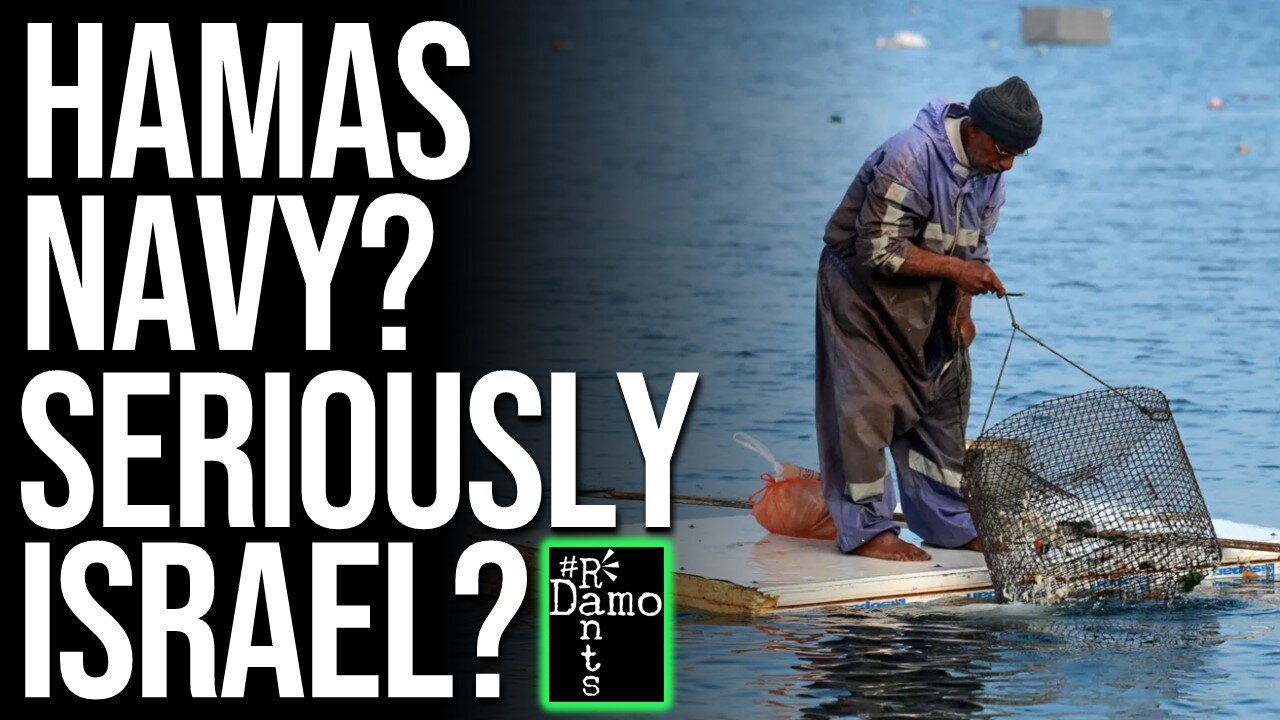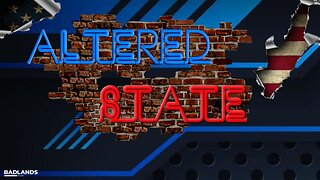Premium Only Content

Israel's Jaw-Dropping Strike on a "Navy" with NO SHIPS!
Right, so it was a day like any other in the ongoing destruction of Palestinian life for the people of Gaza when the Israeli Defence Forces announced they had bravely neutralised a looming maritime threat—an Hamas “naval commander,” no less, lurking not aboard a submarine or destroyer, but in a Gaza internet café. The IDF’s social media platforms thundered with pride; the press dutifully echoed the triumph. Yet for anyone remotely familiar with Gaza’s reality—a besieged strip with no port, no warships, and barely enough fuel to power fishing boats—the claim didn’t spark fear. It sparked laughter. Satirists have had a field day with this. Bring on the memes of snorkel squads and cardboard frigates, because the reality is that would literally be more of a Navy than Hamas actually have. The “Hamas Navy Claim” is just the latest example of Israeli propaganda absurdity. But behind the farce lies something far darker: a deadly distortion that rebrands civilians as combatants, justifies airstrikes with euphemisms, and masks war crimes as military milestones. This is Israeli Hasbara at sea now—where language sinks truth faster than any torpedo, but is doing so alongside whatever is left of Israel’s reputation, because that has sunk just as fast and this farce has just tied lead weights to it.
Right, so on July 6, the Israeli Defence Forces (IDF) triumphantly announced the assassination of a supposed "Commander of the Hamas Naval Force in northern Gaza." According to a tweet they put out, the strike eliminated a major maritime threat—one who was allegedly planning attacks against Israeli targets from the sea. The tweet, from the IDF’s official account read:
‘ELIMINATED: Commander of Hamas’ Naval Force in northern Gaza and additional terrorists. The terrorist Ramzi Ramadan Abd Ali Saleh was eliminated by the IDF in Gaza City. Saleh was a significant source of knowledge within Hamas and in recent weeks, was involved in planning and advancing maritime terrorist attacks against IDF troops operating in Gaza.’
Maritime terrorist attacks eh? Ramzi Ramadan Abd Ali Saleh, was killed in an airstrike on an internet café in Gaza City. Pro Israel supporters dutifully relayed the IDF's version of events, parroting terms like "naval commander" without a hint of irony. But for the rest of the world, particularly Palestinians and those who’ve observed the Gaza Strip’s reality for more than a week, the announcement was met not with awe—but with outright ridicule.
Because let’s be honest: Gaza has no navy. It has no port. It has no ships. It barely has fuel. So how, exactly, is there a "naval commander" operating in a territory where fishermen are regularly shot at for venturing beyond three nautical miles in wooden boats? Is this the sum total of IDF’s maritime force according to Israel? The absurdity of the claim was not lost on critics, who have compared the so-called "Hamas Navy" to a flotilla of plastic kayaks or snorkelling squads armed with harpoons. But beneath the gallows humour lets call it, lies a much darker truth—this isn’t just laughable propaganda. It’s Hasbara and it is deadly: the weaponisation of language to reframe war crimes as legitimate military operations, and civilians as combatants in disguise.
The term Hasbara, which translates as explanation, but is often more euphemistically translated as "public diplomacy," refers to Israel’s comprehensive propaganda strategy designed to shape global opinion. Nobody invests in selling lies as gospel truth like Israel does. More accurately, Hasbara is a psychological and rhetorical campaign to present Israel as a rational, victimised, morally upstanding democracy besieged by irrational and terrorist enemies. This ideological framework has been crucial in maintaining diplomatic support, especially from Western powers, despite Israel's routine breaches of international law.
At the core of Hasbara is linguistic manipulation. Palestinians are not civilians but "human shields" or "terrorist operatives." Homes are "terrorist infrastructure." Hospitals are "command centres." Schools are "weapons depots." And now, Gaza's impoverished fishermen are being recast as members of a navy, because that is the logical step to jump to here. By invoking military rank and maritime power, by naming a known Hamas operative, the IDF can sell a vision that transforms civilian activity—into a seaborne menace and its not as if Israel don’t have form for attacking Gazan fishermen as it is.
This dishonest management of the optics does more than merely reframe events. It actively dehumanises Palestinians, turning them into abstract threats devoid of personal history or civilian status – that’s the crucial bit, it excuses Israeli targeting of civilians. Hasbara renders a child a "youth militant," a medic a "human shield facilitator," and a man on a boat as yet another "naval commander." It allows military violence to continue unchecked by masking atrocity in the language of security. In doing so, it weaponises perception and neutralises public empathy and it has been very successful for a very long time, which is why Israel keep doing it.
That the so-called "naval commander" was killed in an internet café in a besieged war zone didn't give Israel any pause here though. The absurdity was printed as fact, without contextual analysis or basic inquiry. But this fits Hasbara perfectly: reducing scrutiny by inflating the threat, cover up for illegality with jargon, and bury the humanity of the dead under military euphemism.
Gaza has no functioning navy. But it does have fishermen—and they have long been among the most persecuted civilians in the region. Fishing is one of the last remaining pillars of Gaza’s economy. It sustains tens of thousands of families and represents one of the few avenues for food security in a besieged strip of land where over 80% of the population depends on humanitarian aid, aid that these days might get them killed too, so this latest Hasbara story could have particularly sinister overtones, that by framing the fishermen as a Hamas Navy, they cut off yet another line of sustenance to a population being starved to death.
Israel’s views Gaza’s waters as a lifeline for a starving population, but militarily it also sees it as a threat to their security, which must be controlled with ruthless force. The Israeli-imposed Access Restricted Areas (ARAs) change frequently, often without warning. While the Oslo Accords nominally granted Gaza fishermen access up to 20 nautical miles from shore, in practice they are rarely allowed beyond 6 nautical miles—and sometimes as little as 3. Whatever Israel feels like at the time.
Fishermen who sail beyond these arbitrary limits – and even if they don’t - are often fired upon, arrested, or have their boats seized and equipment destroyed. These are not isolated incidents. They are part of a pattern. Human rights organisations have documented hundreds of such attacks over the years.
The cumulative psychological toll on these communities is staggering. Children witness their fathers being shot at, detained, and financially ruined. Entire generations grow up internalising fear of the sea—not because of nature’s unpredictability, but because of militarised occupation. Israel has managed to weaponise the water, transforming a traditional and peaceful livelihood into a perilous, life-threatening risk. To then turn around and suggest that these same men, whose livelihoods are devastated by Israeli patrol boats and live ammunition, constitute a "naval force" is not just dishonest—it's sadistic.
The law however is unambiguous. The Fourth Geneva Convention demands protection for civilians during conflict. The San Remo Manual on International Law Applicable to Armed Conflicts at Sea states unequivocally that fishing vessels should be considered civilian objects unless clearly and directly participating in hostilities. The UN Convention on the Law of the Sea, UNCLOS, while not ratified by Israel, codifies customary international law that prohibits states from imposing blockades that cause starvation or economic destruction to civilian populations which is of course exactly what Israel are doing.
Under these frameworks, Gaza’s fishermen should enjoy protected status. They are neither armed combatants nor operating within any plausible military mandate. They are civilians engaged in subsistence labour. The systemic pattern of violence against them constitutes not only a breach of the principle of distinction, but also a possible crime against humanity under the Rome Statute of the International Criminal Court.
The lack of enforcement mechanisms, however, renders these laws completely toothless and ever word of every law I just uttered is a word of condemnation of the weakness of others. Despite detailed reports by the likes of the UN Human Rights Council, Amnesty International, and numerous local NGOs, there has been no serious international move to sanction Israel for its maritime conduct. The US vetoes everything and the UN go, oh well we tried. Not hard enough you haven’t. The impunity with which these violations continue speaks to the collapse of the so-called "rules-based international order" when applied to the powerful and their allies. Those rules were meant for Western enemies, not their allies and that has become more and more obvious.
Even the airstrike that allegedly killed the "naval commander" took place at a civilian site and resulted in 24 other civilian deaths, hence the Hasbara, the need for a cover up, we’ll make up a Hamas Navy and this guy led it. Such an attack demands rigorous scrutiny. Yet instead of investigations or sanctions, Israel receives applause from its allies for "eliminating a threat."
The IDF described Ramzi Ramadan Abd Ali Saleh as a high-value target responsible for planning maritime operations. They claimed he was a senior member of Hamas’s naval division and was eliminated via a precision strike. But let’s pause to consider the context. This "naval commander" was operating out of an internet café. Gaza’s ports are non-existent. Fuel is scarce. Boats are often patched with salvaged wood and float only by miracle half the time.
The very notion that Hamas maintains a coherent and operational navy under the weight of a 17-year Israeli blockade, aerial bombardments since 2023, and systematic deprivation of resources is ludicrous. You’re either lobotomised or a Zionist to buy this guff. Yet the label is useful. It obscures the power asymmetry between Gaza and Israel. It creates the illusion of parity between an occupying nuclear power and a starving, occupied population and by doing that it is easier for the media to frame this as a war and not a genocide.
Twenty-four civilians were reportedly killed in that strike. There has been no independent verification that I’ve been able to find of Saleh’s actual identity, rank, or his involvement in armed operations. There has been no media scrutiny of the civilian casualties either. There has been no Israeli investigation into proportionality or collateral damage, because they just eliminated a threat, which we have to take their word for, which excuses those civilian deaths, Hasbara does all the heavy lifting for them. All of this was brushed aside with a single label: "naval commander" and that’s enough.
In Israel therefore words can be as potent as missiles. One word can transform a massacre into a mission. One job description can whitewash twenty-four funerals. It is a propaganda sleight-of-hand so effective that it became policy and such important policy, that last December, the Israeli government increased the Hasbara budget by 20 times to now be spending $150m a year on it. The Israeli government’s bloated propaganda budget.
Hasbara has always depended on a complicit media ecosystem, one that uncritically reproduces Israeli talking points. But something different happened this time. The claim about a "Hamas Navy" sparked widespread mockery, because we’ve been watching Gaza closely for 21 months. We’ve seen what Israel have done to a captive occupied population and the reason the Hasbara budget has had to increase, is because it isn’t working nearly so well anymore. Therefore this latest IDF claim went viral not as a PR win, but as a punchline.
This ridicule matters too, because if Israel are spending so much money, on propaganda, the ridicule they get instead is going to hurt them. In the absence of formal accountability, public derision has become a form of grassroots justice. It exposes the gap between narrative and reality. When the world laughs at the IDF’s self-aggrandising language, it chips away at the credibility of that broader propaganda machine. It asks: if they are lying about a navy, what else are they lying about? And if we take the p*ss out of them over it, they will absolutely hate it.
This also marks a turning point in how Hasbara is received. Whereas once the language of security and terrorism was accepted without question, it is now being met with satire, memes, and more critical journalism, at least from some quarters, independent and alternative media. The public’s ability to recognise absurdity has become its defence against complicity. Of course, laughter alone cannot stop missiles. But it can shift public discourse. It can embolden journalists to ask harder questions. It can shame governments into reconsidering their blind support. And above all, it can honour the dead by refusing to let their memory be buried under Israeli lies.
The killing of a man branded as a "naval commander" is just the latest example of Israeli propaganda. It is the latest chapter in a decades-long campaign of narrative warfare, where Palestinians are transformed into militants by decree and murdered without consequence. It is a story where fishermen become threats, boats become warships, and an internet café becomes a command centre.
Meanwhile, on the subject of ships, though in this case, not a warship, but certainly one linked to Israel, because the Houthis of Yemen are back to their Red Sea blockading ways and a ship that tried to risk it, might now be heading for the bottom. Get all the details of that story in this video recommendation here as your suggested next watch.
Please do also hit like, share and subscribe if you haven’t done so already so as to ensure you don’t miss out on all new daily content as well as spreading the word and helping to support the channel at the same time which is very much appreciated, holding power to account for ordinary working class people and I will hopefully catch you on the next vid. Cheers folks.
-
 43:44
43:44
Man in America
7 hours agoAmericans Are About to Lose Everything—And They Don’t Even Know It
37.1K21 -

Adam Does Movies
2 days ago $1.14 earnedTalking Movies + Ask Me Anything - LIVE
27.3K1 -
 LIVE
LIVE
I_Came_With_Fire_Podcast
13 hours agoNASA Blocks China, TPUSA BOOSTED, Chinese Spamoflauge, & Factional Division
260 watching -
 33:40
33:40
Jamie Kennedy
6 hours agoEp 222 Processing the Loss of Charlie Kirk | HTBITY with Jamie Kennedy
46.4K17 -
 1:32:05
1:32:05
Badlands Media
21 hours agoAltered State S3 Ep. 46: Tactical Nukes, Thermite, and the 9/11 Puzzle
62.6K5 -
 9:18
9:18
ARFCOM News
10 hours ago $1.63 earnedNSSF "Celebrates" ATF Partnership | Glocks BANNED | Redundant Spooky Boi Ban
32.4K9 -
 13:09:13
13:09:13
LFA TV
19 hours agoLFA TV ALL DAY STREAM - WEDNESDAY 9/17/25
304K61 -
 1:00:00
1:00:00
BEK TV
1 day agoAPRIL LUND: FAITH, FOCUS, AND THE ROAD TO THE 2028 OLYMPIC MARATHON
22.7K -
 37:15
37:15
Stephen Gardner
5 hours ago🔥Trump ERUPTS After Obama’s Charlie Kirk Comments!
35.3K68 -
 13:40:35
13:40:35
Total Horse Channel
16 hours ago2025 WDAA Western Dressage World Championship Show | Day Two | Arena One
26.1K